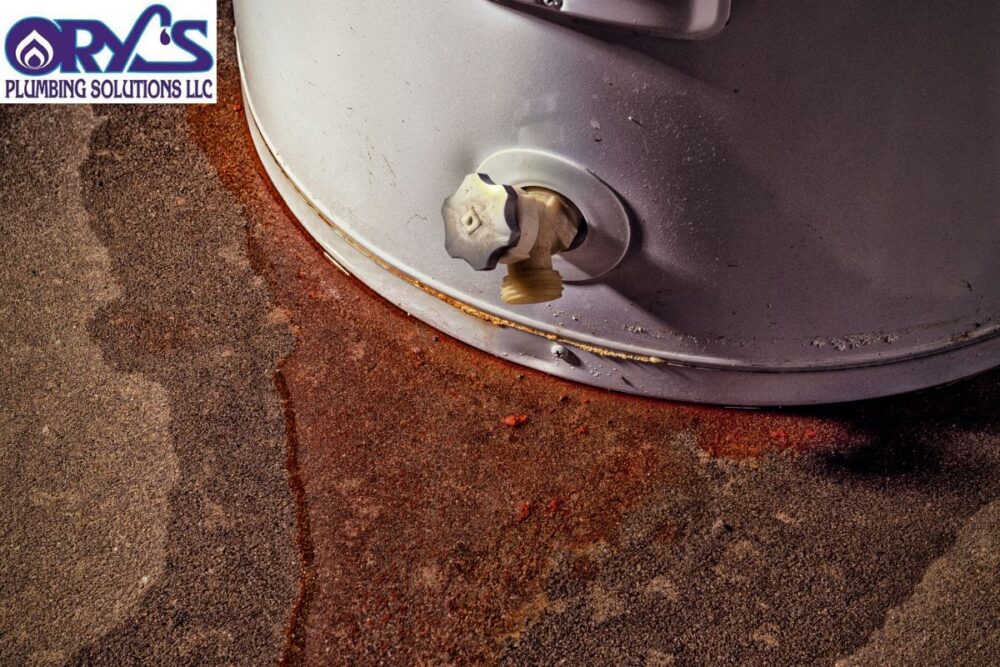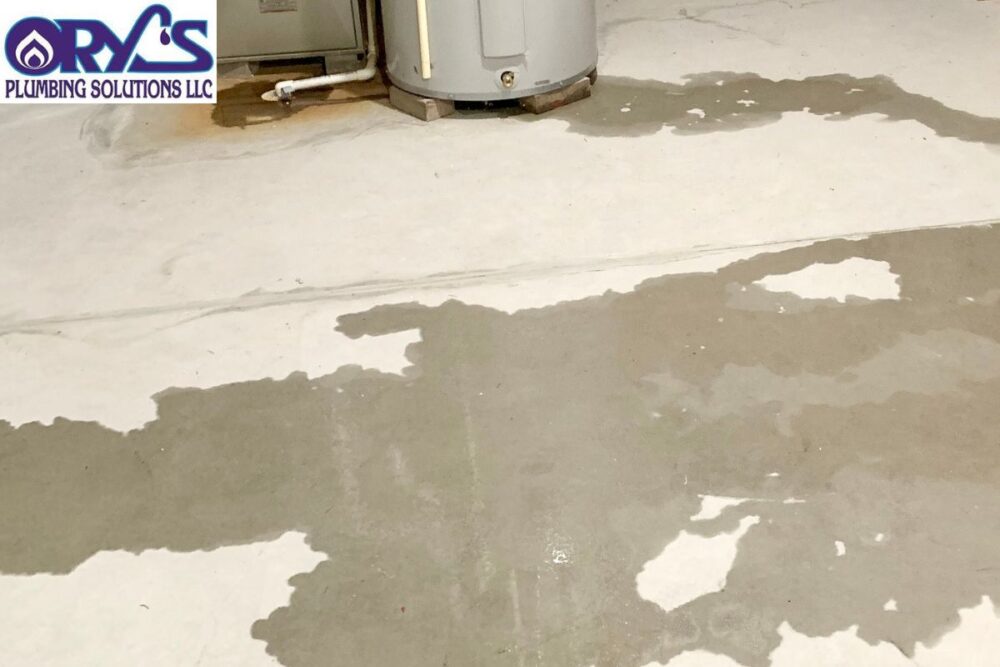What to do If Water Heater Leak
Key Takeaways
- Spot early signs like puddles, rust, or strange noises to catch leaks before major damage.
- Immediately shut off water and power to the heater for safety.
- Minor leaks from valves or connections may be DIY fixes, but tank leaks need a plumber.
- Regular maintenance like flushing the tank and checking the anode rod helps prevent leaks.
Your water heater is a very important appliance in your home, giving you hot water for showers, washing dishes, and laundry. Imagine trying to do these things with only cold water—it wouldn’t be fun! That’s why keeping your water heater working well is so important.
However, sometimes water heaters can leak, and this can cause big problems. A leak can damage your floor, walls, and even lead to mold if not taken care of quickly. The goal of this guide is to help you understand what to do if your water heater starts leaking, so you can fix the problem and avoid bigger messes.
How to Identify a Water Heater Leak
Spotting a water heater leak early can save you a lot of trouble and money. You might not always see a flood right away, so it’s good to know what signs to look for.
Signs of a Leaking Water Heater
- Puddles or damp floor: The most obvious sign is water gathering around the base of the water heater.
- Damp spots or stains on nearby walls: Water can seep into drywall or other materials near the heater.
- Rust or corrosion: Look for rust on the outside of the water heater tank or on the pipes connected to it.
- Strange noises: Hissing, dripping, or gurgling sounds that you don’t usually hear can mean there’s a leak or other problem inside.
- Higher water bills: If your water bill suddenly goes up without a clear reason, it could be a hidden leak.
Different Leak Sources
Leaks can come from different parts of your water heater:
- The tank itself: This is often the worst kind of leak, usually meaning the tank is old and needs to be replaced.
- Pipes and connections: The pipes that bring cold water in and send hot water out can sometimes become loose or corroded.
- Valves: The temperature and pressure (T&P) relief valve or the drain valve can also leak.
Why Early Detection is Important
Catching a leak early means less water damage to your home. Small leaks can turn into big ones quickly, leading to costly repairs and even mold growth. Regular checks around your water heater can help you spot issues before they become major problems.
Immediate Steps to Take When You Notice a Leak
If you see water leaking from your water heater, don’t panic! Taking these immediate steps can help prevent further damage and keep your family safe.
Turn Off the Water Supply to the Heater
This is the most important first step. Look for a valve on the cold water pipe that goes into the top of your water heater. It usually has a handle you can turn to shut off the water. If you can’t find it or it doesn’t work, you might need to turn off your home’s main water supply. This main valve is often found in your basement, garage, or outside near the curb.
Turn Off the Power or Gas Supply to Avoid Hazards
You need to stop the power to the water heater so it doesn’t try to heat water while it’s leaking, which can be dangerous.
- For electric water heaters: Go to your home’s electrical panel (usually a gray metal box with many switches). Find the circuit breaker labeled for your water heater and flip it to the “OFF” position.
- For gas water heaters: On the gas control valve located on the front of the water heater, turn the dial or switch to the “OFF” or “PILOT” position. If you smell gas, leave your home immediately and call your gas company from a safe distance.
Place a Bucket or Towels to Catch Leaking Water
While you’re shutting off the water and power, put buckets, towels, or old rags around the water heater to soak up the water that’s already leaked and catch any new drips. This helps protect your floor and keeps the area from becoming too slippery. If you have a floor drain nearby, you can try to guide the water towards it.
Avoid Using Water Until Fixed
Once you’ve turned off the water supply to the heater, do not use any hot water in your home. This includes showers, washing dishes, or running the washing machine. Using hot water when the heater is off can cause more problems or even damage the unit. It’s best to wait until the leak is fixed and the water heater is working properly again.
Common Causes of Water Heater Leaks
Understanding why water heaters leak can help you prevent future problems. Leaks usually happen because of age, damage, or wear and tear on different parts.
Age and Wear of the Tank
Water heaters typically last about 8 to 12 years. As they get older, the metal inside the tank can start to rust and weaken, especially at the bottom where sediment collects. This corrosion can lead to small cracks or holes, causing the tank to leak. If your water heater is more than 10 years old and the tank itself is leaking, it’s usually time for a replacement.
Loose or Damaged Connections
The pipes that bring cold water into the tank and send hot water out are connected with fittings. Over time, these connections can become loose, or the seals around them can wear out. This can cause slow drips or steady leaks. The drain valve at the bottom of the heater, used for flushing the tank, can also become loose or damaged and start leaking.
Faulty Pressure Relief Valve
Every water heater has a safety device called the temperature and pressure (T&P) relief valve. This valve opens up to release water and steam if the temperature or pressure inside the tank gets too high, preventing an explosion. If this valve leaks constantly, it could mean it’s faulty and needs to be replaced, or that your home’s water pressure is too high, which puts stress on the entire system.
Corrosion or Rust Buildup
Rust is a common enemy of water heaters. Inside the tank, a metal rod called an anode rod helps prevent rust by attracting corrosive elements. However, this rod wears out over time. If it’s not replaced, the tank itself can start to rust. Outside the tank, rust can appear on the connections or around the base, indicating a leak or the start of corrosion. Rusty water coming from your hot water taps is also a strong sign of internal corrosion.
How to Fix a Water Heater Leak (DIY vs Professional Help)
Once you’ve stopped the leak temporarily, you need to decide if you can fix it yourself or if you need to call a professional. Some leaks are easy to fix, while others require expert help.
When to Try Simple DIY Fixes
- Loose connections: If you see water dripping from the connections where pipes attach to the water heater, try gently tightening them with a wrench. Make sure not to overtighten, which can cause more damage.
- Faulty drain valve: If the leak is coming from the drain valve at the bottom, try tightening it with a wrench. If it’s still leaking, you might be able to replace the valve yourself if you’re comfortable draining the tank and working with plumbing parts. Make sure to turn off the water and power first.
- T&P valve: If the T&P valve is just dripping occasionally, it might be a temporary pressure issue. However, if it’s constantly leaking, it likely needs to be replaced. This can be a DIY project for those with some plumbing experience, but it’s important to do it correctly for safety.
When to Call a Professional Plumber
You should always call a professional plumber if:
- The leak is from the main tank: If the water heater tank itself is cracked or leaking, it almost always means you need a new water heater. This is not a DIY fix.
- You are not comfortable with gas or electrical work: Dealing with gas lines or high-voltage electricity can be dangerous if you don’t know what you’re doing. It’s safer to leave this to the experts.
- The leak is severe or you can’t find the source: If water is gushing out or you can’t figure out where the leak is coming from, a plumber has the tools and experience to diagnose and fix the problem quickly.
- Your water heater is old: If your water heater is more than 10–12 years old and leaking, a plumber can advise if it’s more cost-effective to replace it than repair it.
Importance of Safety When Handling Water Heaters
Always prioritize safety. Before doing any work on your water heater, make sure the water supply and the power/gas supply are completely turned off. If you’re unsure about any step, or if the problem involves gas or electricity, it’s always best to call a licensed plumber or technician. Don’t risk injury or further damage to your home.
Preventing Future Water Heater Leaks
Taking care of your water heater can help it last longer and prevent surprise leaks. A little regular maintenance goes a long way.
Regular Maintenance Tips
- Flush the tank annually: This is one of the most important things you can do. Sediment (like sand or rust) builds up at the bottom of the tank. This sediment can make the tank less efficient and cause it to corrode faster, leading to leaks. Draining a few gallons of water from the tank once a year helps clear this buildup.
- Check the anode rod: Inside your water heater is a “sacrificial” anode rod that slowly rusts instead of your tank. It needs to be checked every few years and replaced if it’s worn out. This helps protect the tank from corrosion.
- Inspect valves and pipes: Periodically look at the temperature and pressure (T&P) relief valve and all the pipes and connections. Look for any signs of corrosion, drips, or dampness.
- Test the T&P valve: Once a year, gently lift the lever on the T&P valve for a few seconds until water comes out. This ensures the valve is not stuck and will work if needed. Be careful, as the water will be hot.
Signs to Watch for Early Leaks
Beyond obvious puddles, pay attention to:
- Rusty water: If the hot water coming from your faucets looks rusty, it can be a sign that the inside of your tank is corroding.
- Strange sounds: Popping, crackling, or rumbling noises can mean there’s a lot of sediment buildup in the tank, which can lead to leaks.
- Inconsistent hot water: If you’re running out of hot water faster than usual, or the water isn’t as hot, it could be a sign of a problem that could eventually lead to a leak.
Replacing Old Water Heaters Before Failure
If your water heater is getting old (over 10 years), even if it’s not leaking yet, consider planning for a replacement. Older units are more likely to fail suddenly, and replacing it before it leaks can save you from a major mess and emergency repair costs.
When to Replace Your Water Heater
Sometimes, fixing a leak isn’t worth it, and it’s better to get a new water heater. Knowing when to replace it can save you money and headaches in the long run.
How to Know If It’s Time for a New One
- Age: If your water heater is 10 years old or more, it’s nearing the end of its life. While some can last longer, they become less efficient and more prone to problems.
- Tank leaks: If the leak is coming from the main tank itself, it’s almost always a sign that you need a new water heater. Tank leaks are usually not repairable.
- Frequent repairs: If you’re constantly calling a plumber to fix different issues with your water heater, the repair costs can quickly add up and exceed the cost of a new unit.
- Rusty water: If the hot water coming from your faucets is rusty, it indicates that the inside of your tank is corroding, and it’s time for a replacement.
- Loud noises: Excessive rumbling, popping, or banging noises usually mean there’s a heavy buildup of sediment, which can reduce efficiency and lead to tank failure.
Benefits of Upgrading to a Newer, More Efficient Model
Replacing an old water heater can bring several advantages:
- Energy savings: Newer models are much more energy-efficient, meaning they use less electricity or gas to heat your water. This can lead to lower energy bills every month.
- Reliability: A new water heater gives you peace of mind that you won’t suddenly run out of hot water or wake up to a leak.
- Better performance: Newer units often heat water faster and can supply more hot water for your household needs.
- Warranty: New water heaters come with a warranty, covering parts for several years.
- Different types: You might consider upgrading to a tankless water heater (which heats water on demand) or a heat pump water heater (which uses less energy) for even greater savings and efficiency.
Conclusion
A leaking water heater can be a stressful situation, but by knowing what to do, you can manage the problem effectively. Remember to act quickly: turn off the water and power supply as soon as you notice a leak. While some minor leaks can be fixed with simple DIY steps, it’s important to know when to call a professional plumber. Timely action can prevent major water damage, higher repair costs, and ensures your home stays safe. Regular maintenance can extend your water heater’s life and help you avoid future leaks. If your water heater is old or frequently problematic, consider replacing it with a new, more efficient model. Don’t hesitate to seek professional help if you’re unsure about any step your safety and your home’s well-being are most important.
Want to learn more about keeping your water heater in top shape?
Check out our other helpful guides:
Common Problem of Water Heater
How Long Does a Hot Water Heater Last
What Size Tankless Water Heater Do I Need
What Are the Signs of a Failing Water Heater
How Long Does a Water Heater Take to Heat Up
What Causes a Tankless Water Heater to Stop Working
Should I Repair or Replace My Water Heater
What Causes Gas Water Heater to Stop Working
What Causes an Electric Hot Water Heater to Stop Working
What Causes a Water Heater to Leak?



